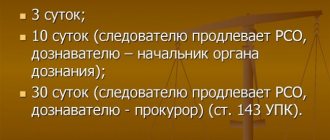What is a supervisory authority
The supervisory authority is the courts that have the right to check the legality and validity of court decisions and sentences that have already entered into legal force.
- For civil cases Appeal to the Presidium of the Supreme Court on complaints from persons participating in the case and other persons if their rights, freedoms and legitimate interests are violated by these court decisions within three months from the date of their entry into force (Chapter 41 of the Code of Civil Procedure of the Russian Federation) .
- For criminal cases there are 3 (three) stages: Judicial Panel, Presidium and Chairman.
- For arbitration cases, the Rules for such a review are enshrined in Chapter 36.1 of the Arbitration Procedure Code of the Russian Federation. A supervisory appeal in an arbitration case within 3 months from the date when the controversial judicial act came into force (Part 4 of Article 308.1 of the Arbitration Procedure Code of the Russian Federation) is sent to the Presidium of the Supreme Court of the Russian Federation and only if the stage of the second cassation has passed in the Judicial Collegium for Economic disputes (Article 308.1 of the Arbitration Procedure Code of the Russian Federation).
Grounds for cancellation (change) of court decisions in the order of supervision
Article 391.9 of the Code of Civil Procedure of the Russian Federation clearly defines three factors that may be grounds for canceling or amending a court decision (by way of supervision). We are talking about a court decision, as a result of which the following were violated:
- the rights and freedoms of citizens prescribed in the Constitution of the Russian Federation, dictated by the norms of international law and outlined in treaties concluded between Russia and other countries;
- the rights and interests of society as a whole;
- a uniform approach to the interpretation and application of current legislation.
Thus, if at least one of the above grounds is present, the court decision can be canceled or changed in supervisory proceedings.
History: development at the initial stage
In Soviet times, the formation of the supervisory institution was influenced by three factors:
- The principle of legality. Having a constitutional nature, this provision necessitated the annulment of acts of justice that had entered into force, but at the same time contradicted the norms of legislation.
- Limitation of appeal. To protect the interests of the parties, it was not allowed to file an endless number of complaints, thus reducing the stability of decisions, delaying execution, and reconsidering the case only because one of the participants did not agree with the court’s conclusions (often unreasonably).
- State influence. One of the main tasks of the authorities at that time was the maximum promotion and strengthening of state intervention in private legal relations.
Who has the right to file a supervisory complaint?
Having figured out where to write a supervisory complaint in a criminal case, you need to understand who has the right to perform such an action. This issue is regulated by the first paragraph of Article 412.1 and Article 401.2 of the Code of Criminal Procedure. According to these provisions of the law, the following subjects of criminal proceedings are vested with the right to file:
- convicted persons;
- acquitted persons;
- victims;
- any other subjects of criminal proceedings whose rights were violated by a court decision.
A complaint can be submitted either personally or through a representative. For example, writing a complaint on behalf of a person serving a sentence must be his representative, who has the appropriate power of attorney certified by a notary or the head of the colony.
Supervisory authority: general information
The main feature of this institution is that it acts as one of the ways to revise decisions that have entered into force. A supervisory authority is a body that checks the compliance of decisions, resolutions, and determinations with the law. The exception in this case is the decisions of the Presidium of the RF Armed Forces. Judicial supervisory authorities are:
- Collegiums (military).
- Supreme courts of the Russian Federation and its constituent entities. The consideration of the case is carried out by the presidium.
- Supreme arbitration judicial body. It also holds meetings by the presidium.
Grounds for establishing supervisory proceedings in the prosecutor's office
For any check, as well as protest, there must be grounds. In the case of such proceedings, the court verdict can be verified by the authorized body only if the applicant has provided grounds for this. After all, no one has the right to simply check the legality and grounds of a court’s verdict. According to the law, this can only be done on the basis of:
- supervisory representation;
- supervisory complaint.
The difference between these documents is that the first is submitted by the prosecutor, while the second is submitted by a person interested in the process or his representative.
Procedure for consideration
How does the supervisory authority act in civil proceedings? Cases are considered at a meeting for no more than a month, and in the Supreme Court - no more than 2 months before a ruling is made. The case being examined by the supervisory court is reported by the chairman, his deputies or other members of the presidium on behalf of higher officials. The circumstances may also be read out by another official of the given body who has not previously participated in the meeting. If the case is considered by a panel, then one of the judges from its composition reports. The same procedure is established for criminal proceedings.
Procedural deadlines
Supervisory complaints in civil and arbitration proceedings within the framework of administrative proceedings (under the CAS) can be sent to the supervisory no later than 3 months from the moment the contested decision enters into legal force (clause 2 of article 391.2 of the Code of Civil Procedure, clause 5 of art. 308.1 APC, clause 2 of article 333 CAS). The period for filing a complaint with the supervisory authority in the framework of legal proceedings in criminal cases and administrative offenses (under the Code of Administrative Offenses) is not limited.
Maximum period for studying a complaint by a supervisory authority :
- in civil proceedings: if the case was not requested - 2 months, if the case was requested - 3 months (clause 1 of Article 391.6 of the Code of Civil Procedure);
- in the arbitration process: if the case was not requested - 2 months, if the case was requested - 3 months (clause 1 of article 308.5 of the Arbitration Procedure Code);
- in criminal proceedings: if the case was not requested - 1 month, if the case was requested - 2 months (Article 412.6 of the Code of Criminal Procedure);
- in the process of an administrative case: 2 months from the date of receipt of the complaint or protest by the court, in the case of a request for materials on the case - 1 month from the date the case was submitted to the court (Clause 3 of Article 30.16 of the Administrative Code);
- in the process of administrative proceedings: according to the general rule, if the case materials were requested - 3 months, if they were not - 2 months (clause 1 of Article 336 CAS).
Important point
Considering the essence of supervisory activities, it is necessary to understand the differences between its objects and those during cassation review. The first covers a wider area. This is proven by the following points:
- The subject of a cassation appeal is only the decision and ruling of the court of first instance, while supervisory review can be used for decisions and rulings of a court of any instance.
- Due to the repeated cancellation of a decision and its remand for new proceedings, several acts may be adopted. The possibility of cassation appeal applies only to the last decision that has not entered into legal force. At the same time, the validity and legality of previously canceled acts is not verified. Judicial supervisory authorities are bodies that assess the compliance with the law of all previously appealed decisions, decisions, and determinations.
Characteristics of supervisory review:
- can only be carried out by the supervisory courts specified in the law (Presidium of the Supreme Court of the Russian Federation - Article 391.1 of the Code of Civil Procedure of the Russian Federation), which have broader powers than cassation courts;
- only on the basis of a judge’s ruling to transfer the case for consideration of a complaint or a prosecutor’s presentation on the merits in a supervisory court or a reasoned submission to revise court decisions in the order of supervision of the Chairman of the RF Supreme Court, Deputy Chairman of the RF Supreme Court (Article 391.5 of the Code of Civil Procedure of the Russian Federation);
- the subject of review in the order of supervision is court decisions that have entered into legal force (they can be not only decisions and rulings of the court of first instance, but also decisions and rulings of the courts of appeal and cassation);
- special grounds for canceling or changing court decisions in the order of supervision (Article 391.9 of the Code of Civil Procedure of the Russian Federation);
- decisions of the supervisory court are not subject to further appeal.
Appeal
An appeal is filed if one of the parties is dissatisfied with the decision made by the district court. Thus, both the defendant and the plaintiff can apply.
In order for a complaint to successfully proceed through the courts, it is necessary to comply with the formalities provided for by law, namely, the procedure for registering and sending an appeal to the court. It is equally important to comply with deadlines. This is especially true in cases where government bodies become participants in the proceedings. Thus, fighters against housing and communal services for the rights and freedoms of citizens should adhere to deadlines like the apple of their eye. The state protects its citizens, but it protects itself doubly.
Features of compilation
Requirements required by law when filing an appeal:
- there cannot be factual errors in the text of the document; only essential details should be clarified;
- every word of the plaintiff directed against the court order must be documented, otherwise it will be used against you;
- to develop a firm and confident position, it is necessary to study all the materials of the case with particular scrupulousness;
- The business tone of the statement is a mandatory point when drawing up a complaint. The court will not consider a complaint written in street language;
- spelling, grammatical, punctuation errors and blots are also the enemy of the plaintiff. If the document was damaged when drawn up by hand, it is better to start from scratch.
Citizens' petitions drawn up without taking into account the above requirements will be rejected without a chance for consideration. Therefore, it is worth approaching the drafting of a document with feeling, sense and order.
The legislation also imposes a number of requirements on the content:
- indicate the name and address of the court to which the complaint is filed;
- Full name of the applicant or name of the legal entity, residential or location address, contact details;
- after this, the applicant must indicate the date of the disputed decision, its number and the name of the judge with whom the plaintiff was dissatisfied;
- indication of the grounds for filing a complaint;
- clearly stated requirements of the applicant.
Separately, it is worth considering the grounds for filing a complaint and the requirements that a citizen must present. Thus, the grounds for the application are:
- ignoring or incorrect interpretation of the circumstances presented by the applicant;
- incorrect identification of legitimate reasons for going to court;
- the court ruling is contradictory in relation to the facts considered at the trial;
- the court made errors that violate the procedural code corresponding to the case under consideration.
The requirements that a citizen can identify in a complaint are regulated by law. So, a citizen can ask:
- to cancel the appealed court decision and issue a new one;
- on a full or partial review of a district court decision;
- on the annulment of the contested decision and the closure of the case;
- on complete or partial annulment of a court decision or partial refusal to consider a received claim.
If necessary, a citizen has the right to indicate which part of the resolution needs to be changed or repealed. A citizen can file an appeal with a list of demands presented to him earlier. The addition to the list of requirements directly contradicts the law.
The claim must be supported by documentary information. To summarize, the applicant indicates the date the complaint was filed and leaves his personal signature. When filing a complaint by a legal entity, the document must contain the seal of the organization.
It is important to consider that the filing of an appeal depends on where exactly the complaint will be sent.
Where to send a complaint
An appeal is filed by a citizen when challenging decisions in all types of judicial proceedings. Therefore, it is possible that the rules for registering and filing an appeal will differ significantly from case to case, since the requirements of the law take into account the characteristic features inherent in each branch of law.
Appeals are considered by the courts of the jurisdiction within which the proceedings took place. Thus, arbitration is responsible for exclusively considering civil cases and appeals thereon. Disputes in criminal cases are a headache for the Board of Appeal.
It is impossible to make a mistake when filing a complaint, since the appeal is filed with the court that issued the contested decision. The complaint will then be forwarded to the body authorized to review claims.
Once all possibilities for filing an appeal have been exhausted, the ordeal for the applicant continues with the cassation authorities. The RF Armed Forces become the last stronghold. If the complaint is rejected by the Supreme Court, one can only rely on Western partners, namely the ECHR.
Collection of state fees
What any law-abiding citizen cannot escape is the state duty collected. Its payment is a mandatory condition when filing an appeal. As one might assume, for harmfulness. The petitioner or the judge is no longer known.
The fee is 150 rubles for individuals and up to 3,000 rubles for organizations.
Litigation for the consideration of economic disputes involves other costs. When applying to arbitration, the price tag is 3,000 rubles, but the cost may increase, depending on the status of the plaintiff. If the state duty is not paid, the matter will not go far.
Powers of the supervisory court
The court of supervisory authority in civil, administrative, criminal and other cases within the jurisdiction of courts of general jurisdiction in Russia is the Supreme Court of the Russian Federation (Article 126 of the Constitution of the Russian Federation). The Supreme Court of the Russian Federation acts as a subsequent supervisory authority regarding the supreme courts of the constituent entities of the Russian Federation when studying cases of administrative offenses (Clause 3 of Article 30.13 of the Code of Civil Procedure).
supervisory court is authorized to:
- preserve judicial acts issued in previous instances without making changes to them;
- cancel judicial acts issued in previous instances, in part or in whole, and send the materials for new study;
- annul judicial acts passed in previous instances, in whole or in part, and complete the proceedings or keep the application unconsidered;
- preserve the force of one of the judicial acts issued in previous instances;
- cancel or amend a judicial act issued by a previous instance and draw up a new ruling on the case without sending the case itself for study, if the supervisory authority has identified an incorrect interpretation or use of the provisions of substantive law;
- leave the said complaint without examining the merits.
For what reason are supervisory proceedings initiated?
Supervisory proceedings in civil proceedings differ from those in criminal proceedings, by and large, only in the composition of the offense. Therefore the procedure is the same in both cases. The reason for initiating this process can only be information that indicates that the court verdict was made illegally and without proper grounds. It is also important that there is no time limit for filing a supervisory complaint. In addition, there are several supervisory authorities. That is, the same case can be considered more than once during supervisory proceedings in criminal or civil proceedings.
The supervisory procedure gives the right to review:
- any decisions of the first court;
- verdicts of the judge when he appoints a court hearing;
- resolution of cassation appeals;
- determinations that were made during the execution of the sentence;
- decisions of supervisory authorities of a lower rank.
Where and how to file a supervisory complaint
First of all, you need to understand where a supervisory complaint in a criminal case is filed. According to current legislation, a complaint must be filed directly with the Supreme Court of the Russian Federation. This can be done in person, or by sending a registered letter by mail. From January 1, 2022, it became possible to contact the supervisory authority by sending a complaint electronically.
It must be taken into account that the Presidium of the RF Armed Forces can review, by way of supervision, court decisions listed in the third paragraph of Article 412.1 of the Code of Criminal Procedure.
What is a supervisory complaint in a criminal case? In essence, this is an appeal to the Supreme Court with a request to consider a criminal case and the decision made on it in order to eliminate the errors made by the lower court. The main purpose of reviewing a contested sentence is to determine the degree of its legality and its compliance with the requirements of the legislation in force in the territory of the Russian Federation.
Requests made by filing a complaint may be satisfied in whole or in part. As a result of this, decisions, rulings and sentences that have entered into force may be canceled or changed. This is possible if the Presidium of the Supreme Court discovers deviations from the provisions of the current Criminal Code and the Code of Criminal Procedure of the Russian Federation.
Most often, filing a supervisory appeal to the Supreme Court of the Russian Federation in criminal cases is motivated by the fact that lower courts take into account when making a decision evidence that was obtained illegally and, therefore, is inadmissible.
You can't make the situation worse
Article of the Code of Civil Procedure No. 448 establishes the grounds aimed at canceling decisions made during supervision, due to their unfoundedness or identified violations.
The decisions made will be considered unfounded in the case of incomplete examination of the facts that have become unaccounted for evidence and facts, without confirmation and evidence, but which have become the basis for the decision.
Reasons for cancellation/change of regulations
Additional documentation for the complaint
With a properly prepared application, the applicant must provide copies of the following documents:
- Sentence (decision) subject to review.
- Definition of cassation/appeal.
- Another documentary package, which, in the opinion of the applicant, can confirm the arguments expressed by him.
It is worth mentioning that there is no need to request files, since this item does not relate to a mandatory function. The supervisory authority may also make its decision based on the material provided by the applicant.








